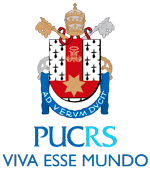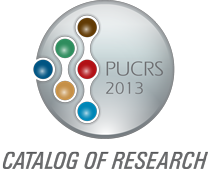Foreword
Research Structures
Energy, Environment, and Biodiversity
- Metallic Materials Engineering
- Solar Energy
- Biodiversity and Ecosystems in Fields and Forests of the Atlantic Forest
- Economic, Human, and Environmental Development
- Primatology
- Genetics, Evolution, Ecology, and Conservation of Carnivores
- Oleochemistry: Processes and Products
- Technologies to Mitigate Environmental Impacts
- Ichthyology
- Ornithology
- The Center for Wind Energy
Humanities and Ethics
- Fundamental Rights
- Theological and Ethical Anthropology
- The Political Authoritarianism and Press in Contemporary Brazil
- Christology within the Contemporary Latin American Context
- Law and Bioethics
- Clinical Bioethics
- Ecclesiology and Emergent Problems
- Analytic Epistemology
- Ethics, Contemporaneity, and Deconstruction: The Philosophical Criticism of Violence
- Immigration, Towns, and Foreigners Narratives of Brazil (1864–1964)
- Criminal Procedure and Democratic Rule of Law
Culture and Education
- Southern Writers Collection
- Architecture and Heritage
- Culture, Subjectivity, and Formative Policies
- Between the Memories and Stories of Schools at Rio Grande do Sul: From the Deutscher Hilfsverein to Farroupilha School (1858-2008)
- Enunciation and Discourse
- Education for Health and Inclusive Education
- Teaching of Physics
- Format Y: Formation in Mathematics for Generation Y
- History of Literature: The Investigation and Diffusion of Sources
- Reading Literature: The School and Other Social Agencies
- Chemical Education
- Relationship between the Nature of Science and Science Education
- Literature, History, and Theories on the Imaginary
- Training of Professors, Licentiates, and Pedagogical Practices
Society and Development
- Companies and Organizations
- Law and Economy
- Study and Research on Violence
- Family, Social Work, and Health
- Architecture and Industrialization
- Agribusiness
- Social Well-being Economics
- Applied Mathematics
- Class Action Lawsuits
- Psychology and Social Policies: Memory, History, and Production of the Present Time
- Inter-organizational Relationships and Systemic Competitiveness
- Parties, Elections, and Political Communication
- Fundamental Principles of Tax Law
- Social Demands and Policies
Information and Communication Technology
- Wireless, Wired, and Optic Communications
- Organizational Communication
- Strategy and Innovation
- Hardware Project Support
- Computing Molecular Biophysics – The Modeling and Simulation of Biosystems
- Technological Development in Telehealth
- Resource Management and Virtualization
- The Management and Governance of Information Technology
- International News at the Global Village
- Communication Science
- Ubiquity and Technological Convergences in Communication
- Aerospace Research
- The Performance Evaluation Group
- The Group on Systems, Signals, and Computing
Biology and Health
- Cancer and Other Pathologies of the Oral and Maxillofacial Region
- Memory
- Molecular and Functional Biology
- Cardiometabolic Risk, Aging, and Nutrition
- Health Education and Work
- Structural Biochemistry
- Pediatric Respirology
- Applied Pharmacology: Characterization of Mechanisms Involved in Pain, Inflammation and Cancer
- Immunology and Immunodiagnostics
- Nephrology
- Neurosciences
- Orthodontics
- The Promotion of Health in Longevity
- Olympic Studies and Health Sciences
- Nerve Regeneration
- Intensive Neonatal Medicine and Congenital Infections
- Aerospace Pharmacy
- Medical Imaging
- Pulmonology
- Orofacial Pain and Temporomandibular Disorders
- Metabolic Transformations of Purines of Biological Importance
- The Study of Parasitosis, Biochemical Parameters, and Hematological Parameters Associated with Aging
- Aerospace Science
- Bioethics and Ethics Applied to Animals
- Pharmacovigilance
- Evaluation and Intervention in the Life Cycle
- Surgery for Obesity and Metabolic Syndrome
- Modification of Lifestyle and Cardiovascular Risk
- Nanostructures and Nanoscopy
- Clinical and Experimental Neuropsychology
- Psychology of Occupational Health
- Memory and Neurodegeneration
- Epidemiology, Neurology, and Immunology
- Chemistry of Natural Products
- Health Economics
Research Structures and Researchers
- RESEARCH STRUCTURES AND RESEARCHERS
- Business School: Management, Accounting and Economics (FACE)
- School of Architecture and Urbanism (FAU)
- School of Biosciences (FABIO)
- School of Aeronautical Sciences (FACA)
- School of Social Communication (FAMECOS)
- Law School (FADIR)
- School of Education (FACED)
- School of Physical Education and Sport Science (FEFID)
- School of Nursing, Nutrition and Physiotherapy (FAENFI)
- School of Engineering (FENG)
- School of Pharmacy (FFARM)
- School of Philosophy and Human Sciences (FFCH)
- School of Physics (FAFIS)
- School of Computer Science (FACIN)
- School of Letters: Languages, Linguistics and Literature (FALE)
- School of Mathematics (FAMAT)
- School of Medicine (FAMED)
- School of Dentistry (FO)
- School of Psychology (FAPSI)
- School of Chemistry (FAQUI)
- School of Social Work (FSS)
- School of Theology (FATEO)
- Institute of Bioethics (IB)
- Institute of Geriatrics and Gerontology (IGG)
- Institute of Research and Development (IDÉIA)
- Institute of Biomedical Research (IPB)
- Institute of Toxicology and Pharmacology (INTOX)
- Institute of the Brain (InsCer)
- Institute of Environment and Natural Resources (IMA)
- Museum of Sciences and Technology (MCT)
A legal view on bioethical problems
Abortion, euthanasia, assisted reproduction, genetic engineering, and organ transplants are discussed. To discuss the legal implications of bioethical problems that exert an effect on science and society, PUCRS has supported the Research Group on Law and Bioethics, which has promoted studies focused on the interface between these two fields of knowledge since 2004.
Coordinated by Professor Paulo Vinicius Sporleder de Souza, researchers address subjects related to the criminal, civil, constitutional, and environmental fields involving basic bioethical topics, including the onset of human life, its artificiality, its end, and the concern for the remaining living beings. All these topics involve features of Brazilian legislation, thus strengthening the academic production on Medical Law and Genetic Law.
Hosted by the Graduate Program in Criminal Science (PPGCrim) of the School of Law, this group develops studies along five lines of research that have contributed to the creation of two new disciplines at PPGCrim: Criminal Law and Genetics and Bioethical and Criminal Principles of Medical Criminal Law.
Of the ongoing research projects, one project addresses the age-related ability to consent to medical-surgical interventions. In an article published in Revista Brasileira de Ciências Criminais based on the specialized literature and court jurisprudence, the authors argue that individuals are able to make such decisions beginning at 14 years of age. This study also problematizes the legitimacy of medical interventions as a function of that criminal problem and discusses whether the consent provided by individuals who have been rated as incompetent from the bioethical and criminal perspectives is valid.
The group’s activities are directly associated with the Institute of Bioethics of PUCRS and include seminars, meetings, and a series of lectures that target professors and under- and postgraduate students. The group’s main inter-institutional partnership is with the Bioethical Society of Rio Grande do Sul (Sorbi).




